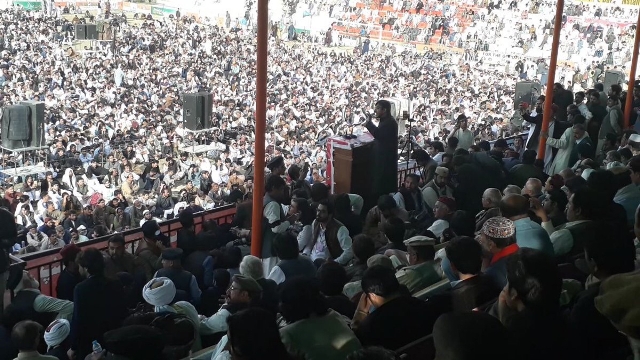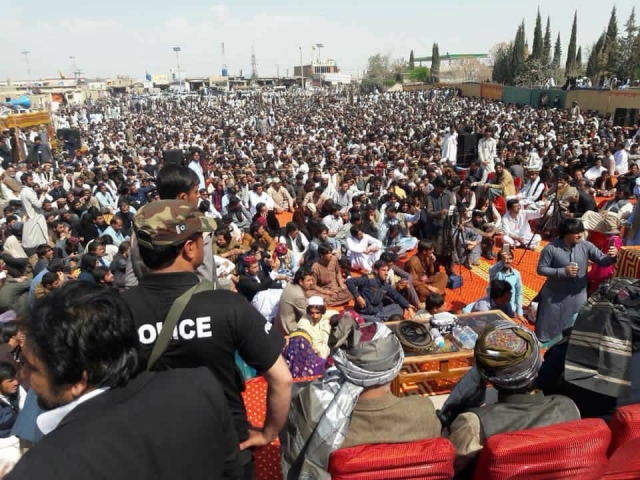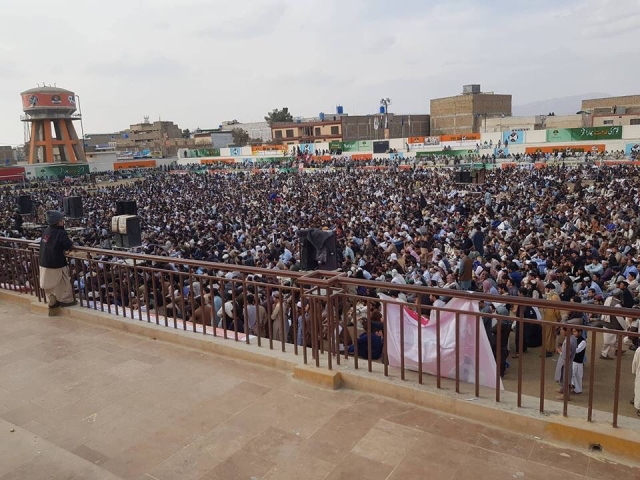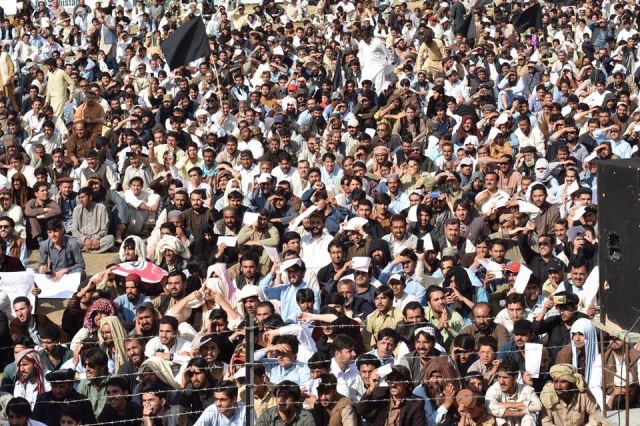The brutalisation and state oppression isn’t confined to Waziristan and other parts of FATA. FATA Pashtuns have been the main target of military and police operations in Karachi also. The present protest was triggered by the murder of of Naqibullah Masood, a young man from Waziristan based in Karachi. Naqib was killed in a fake encounter with police led by Rao Anwar, a police officer notorious for his “ expertise “ of fake encounters. But the narrative that has emerged from the speeches in the sit-in over the last one week is the expression of cumulative alienation of Pashtuns created by state violence, oppression and humiliation. FATA is devastated by the war brought to the area by the misguided Afghan policy of Pakistani state. Pashtuns belonging to FATA remain excluded from modern state systems and full fledged citizenship under an administrative structure devised by colonial rule. Every government in Pakistan has repeatedly backed out on promises to introduce reforms in the area mainly for two reasons. One, FATA has been used as a launching pad for Taliban’s war in Afghanistan and under this Afghan policy it’s the strategic need of Pakistani state to keep it a no go area and a black hole. Two, The huge black economy of the area is milked by Pakistani bureaucratic elites along with local war lords. This powerful vested interest in the status quo effectively blocks all the efforts for reforms. After the large scale deployment of Pakistan army since 2002 and the protracted military conflict has worsened the situation. Four out of the five demands of the Pashtun protest are about military’s control. They include cleaning of the area from land mines and IEDs, bringing an end to enforced disappearances after arbitrary raids on their homes and also stopping the imposition of prolonged curfews in the area. Prime Minister Shahid Khaqan Abbasi told a delegation of the protesters that he will make sure the arrest and trail of Rao Anwar, the police officer responsible for the murder of Naqib Masood. The Prime Minister made no commitment about demands related with Military’s actions but he promised to persuade the GHQ to meet the representatives of the protesting Pashtuns.
It is for the first time in history that a movement that isn’t initiated by any nationalist political party has consistently embraced Pashtun identity. The need for unity required rising above tribal divisions. The mainly spontaneous movement that’s largely blacked out by Pakistan’s Urdu language electronic media, has attracted huge sympathy and support from all sections of Pashtuns not just from within Pakistan but also from Afghanistan and Pashtun diaspora based in UK, US, Canada and many other countries. The anti war narrative of the Pashtun protest in Islamabad has widely resonated with Afghans who are sick of brutality and devastations of war. Pakistani state is nervous and clueless at the outpouring of solidarity and support from wider sectarians of Pashtun society. The Pakhtunkhwa based political parties, that took their time to overcome their initial inhibition, were ultimately forced to join the protest and declare their support for it. Interestingly this protest has become a shoulder for the tears of all Pashtuns aggrieved by state policies and they also include Pashtuns from settled areas. Many people couldn’t hold their tears when Fazal Khan Advocate, whose child was killed in the terrorist attack at Army Public School Peshawar in 2014, narrated the agony and disappointment of his family. Families from Swat raised the issue of enforced disappearances in their areas. Many of the few thousands people caught during military operation remain incarcerated in the so called internment centres. Some have dubbed these centres as Pakistani version of the Guntanamo Bay. Out of the fear of being labeled as “ anti-state” most of the political parties are hesitant to raise such issues on their platforms. Pent up feelings on such “ taboo” subjects have defined the present subject. The active participation of women activists has given a new colour to the protest of tribal Pashtuns who are otherwise dominated by patriarchal traditions. Songs, poetry and slogans recited and raised in the protest are creating an interesting new body of Pashto literature. Pashtun social media activists are using the full potential of the new media for promoting their cause. It’s in this context that some people have called the protest a Pashtun Spring.
Be that as it may, the most positive characteristic of this uprising is its total non violent and civil nature. Instead of going up to their mountains for launching their traditional armed uprisings, people of FATA have learnt to converge on big cities for peaceful political protest. But they have a long way to go for achieving peace and political empowerment.
The brutalisation and state oppression isn’t confined to Waziristan and other parts of FATA. FATA Pashtuns have been the main target of military and police operations in Karachi also.The PTM member also claimed that of the 4,000 missing Pashtuns, only 239 had been recovered.

PHOTO: EXPRESS
Inayatullah Khan, another PTM member who represented the movement in meetings with government representatives, said Khyber-Pakhtunkhwa (K-P) Governor Iqbal Zafar Jhagra had asked for a list of those killed or wounded in landmine explosions for compensation.
Commenting on missing persons, Khan said the Fata political administration should help formulate a list of enforced disappearances.
A lackadaisical government has spurred the PTM into organising a larger demonstration in Islamabad. Slated for March 26, the move has evinced strong interest from people across Peshawar, Quetta, Zhob, Qilla Saifullah and other areas
“We were once just 22 men marching to Islamabad. I believe our cause struck a chord. People joined in droves as we made our way to the federal capital,” rights activist Manzoor Pashteen told The Express Tribune.
In the wake of the Arab Spring, an inspired Pashteen founded the Mehsud Tahafuz Movement in 2013 to secure the rights of tribesmen. An 11-year-old Pashteen left his hometown following a military offensive in Waziristan. What followed was an itinerant life.
“I know how hard it was for my family,” he said. Anyone commanding a following or daring to raise their voice was killed by the Taliban, Pashteen added while reminiscing about militant activities in the tribal areas.

PHOTO: EXPRESS
In 2011, he moved to Dera Ismail Khan to read at Gomal University. It was there that Pashteen found an environment conducive to raising awareness on securing fundamental rights. “I started exhorting peers to do just that at university,” he said.
In late 2016, the Mehsud Tahafuz Movement (MTM) staged its first demonstration against landmines. The rights activist said he was “held” by “authorities” in connection with the demonstrations a year later. “We were told to desist but my job was done,” Pashteen said.
With the January 13 ‘encounter’ of Naqeebullah Mehsud ranks swelled as thousands joined the movement. Talking about the MTM transforming into the PTM, Pashteen said taking a stand was all that was needed at times.
Mohsin Dawar, another movement member, claimed the government had been striving to crush the movement. “FIRs have been registered against activists. Cellular networks are suspended. What they do not know is that these antics will only strengthen our resolve,” he said, adding that all they wanted was to “live with dignity”.
While Pashteen says the PTM has provided Pashtun youth with a platform, others have serious reservations.
“The movement turned into the PTM almost overnight in Islamabad. This poses a question in its own right. I suggested Mazloom Tahafuz as a name to prevent it from acquiring an ethnic premise,” Khan said. “If he stays true, the PTM may taste success. But the movement will founder if executed at someone’s behest,” he said.
Some Peshawar lawyers voiced similar reservations.

PHOTO: EXPRESS
A veteran lawyer told The Express Tribune on condition of anonymity that while a final call was yet to be made, the prospect of any support from the legal community was rather dim.
“It has also been speculated that Pashteen could rival political heavyweights like Awami National Party (ANP) president Asfandyar Wali Khan and Qaumi Watan Party (QWP) chairman Aftab Ahmad Sherpao. This could also explain lawyers’ reluctance to back Pashteen,” he said.

PHOTO: EXPRESS
The aforementioned political parties posited otherwise.
QWP provincial chairman Sikandar Sherpao sympathised with the movement. “His (Pashteen’s) demands are legitimate. Grievances should be addressed unless one wants to jeopardise the federation,” Sherpao told
Tags:
National

